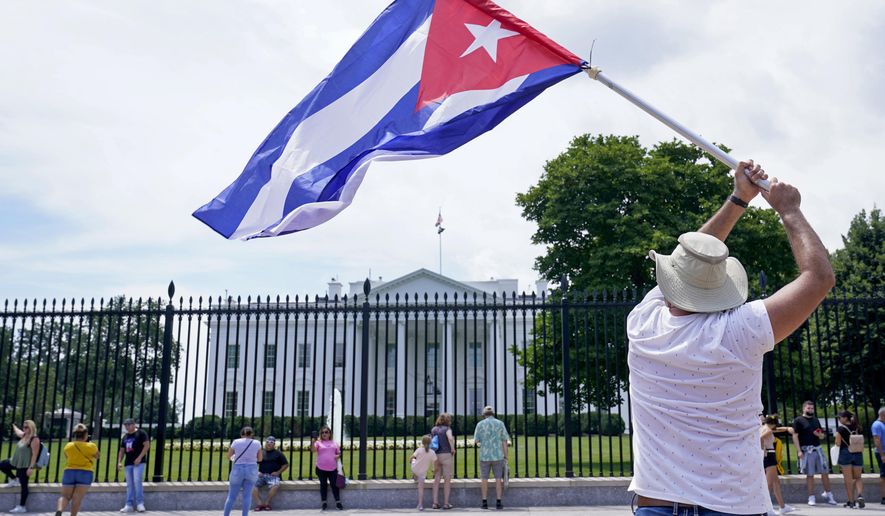OPINION:
Editor’s note: This is one in a series examining the Constitution and Federalist Papers in today’s America. Click HERE to read the series.
The Biden administration’s slow, weak response to protests in Cuba is nothing if not predictable.
After all, President Biden placed partisan bureaucrats who sympathize with the Marxist ideology of the Cuban regime in key government positions. These unelected bureaucrats, who glorify the regime in Cuba, are the ones responsible for the Biden administration’s policy toward Cuba. They would rather cater to Marxists in the Democratic Party’s base than help the Cuban people’s demand for freedom.
Chief among these is Mr. Biden’s deputy assistant secretary in the Bureau of Western Hemisphere Affairs at the State Department, Emily Mendrala. For years, Ms. Mendrala advocated engagement with Havana and organized trips for members of Congress to meet with the evil Castro-Díaz-Canel regime. Cuban state-run media lavished praise on her as a member of “the band of those who love and create.”
How did we get to the point where unelected bureaucrats you’ve never heard of are deciding important policies, such as engagement with an authoritarian regime murdering peaceful protesters 90 miles from our shores?
It’s a good question. Like most lawmaking these days, the answer lies in the vast federal bureaucracy, not Congress.
Our Founders didn’t plan it this way. Article 1, Section 1 of the Constitution states, “All legislative Powers herein granted shall be vested in a Congress of the United States.” They understood the necessity for governmental agencies to administer government, and they established a structure for the implementation of law.
But the power that unelected bureaucrats wield in the federal government today would be unrecognizable to the Framers. Instead of being created by the Framers, the administrative state as we know it owes its origins to President Woodrow Wilson. Rather than self-governance or republican virtue, the defining principle of his presidency was administrative efficiency.
A political “scientist” by trade, Mr. Wilson believed that well-trained, competent elites could govern America and avoid the delay and inconveniences of democratic accountability. President Franklin Delano Roosevelt’s New Deal doubled down on that mindset, giving birth to a sprawling federal bureaucracy with substantial authority to operate in a legislative-like way through federal rule-making.
Then in 1984, the Supreme Court further doubled down on the power of an elite ruling class resident in the federal bureaucracy. In Chevron v. Natural Resources Defense Council, the high court said lower courts should defer to a federal agency’s interpretation of a statute. The decision gave the administrative state nearly unlimited power to set policy — including via internal letters and memos — so long as those policies were not unreasonable and Congress had not specified something contrary.
While narrowed in recent decisions, this so-called Chevron Deference doctrine handed America’s unelected bureaucrats more power than most people realize. What’s more, excessive bureaucracy also means stale governance, slowed by unnecessary rules and regulations that choke productivity and stymie innovation.
Fortunately, conservatives can push back against the administrative state and this century-old imbalance. After President Trump cut through the red tape, the approval time for major infrastructure projects dropped from more than a decade to just two years. America achieved energy independence. When the pandemic hit, regulations on manufacturers were slashed, allowing the U.S. to quickly produce ventilators and other medical equipment.
But those changes were fleeting. Mr. Biden is now giving haven to the bureaucrat elites and their administrative morass. That means more power handed to unelected and faceless regulators and so-called experts. That means more power to people such as Dr. Anthony Fauci. That means more power to the radical Marxists pushing critical race theory in our schools, and more power to bureaucrats who hate the Second Amendment.
This is the ugly face of the administrative state in full view.
In 2001, Justice Clarence Thomas observed that the Supreme Court had “overseen and sanctioned the growth of an administrative system that concentrates the power to make laws and the power to enforce them in the hands of a vast and unaccountable administrative apparatus that finds no comfortable home in our constitutional structure.
“The end result,” Justice Thomas continued, “may be trains that run on time (although I doubt it), but the cost is to our Constitution and the individual liberty it protects.”
It is time to reclaim our country from the unelected bureaucracy of the administrative state.
The solution is congressional action. Elected by the people, members of Congress have the power to repeal statutes and reclaim their role from federal bureaucrats. Unfortunately, congressional Democrats and Mr. Biden believe the administrative state benefits Democrats and their radical left-wing base.
We need lawmakers who understand the consequences of an all-powerful, unaccountable bureaucracy and who support reforming the current administrative state. All too often, these so-called elites end up on the wrong side of history. Our goal must be reclaiming the ideal of a government of, by, and for the people, not a nation serving unelected aristocratic elites in Washington.
• Marco Rubio, a Republican, is the senior U.S. senator from Florida and vice chairman of the Senate Select Committee on Intelligence.





Please read our comment policy before commenting.